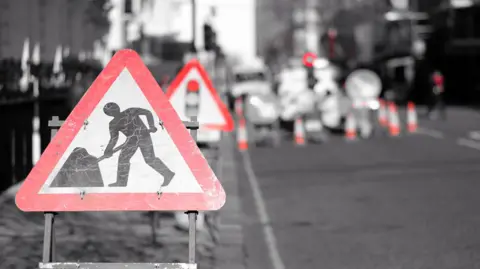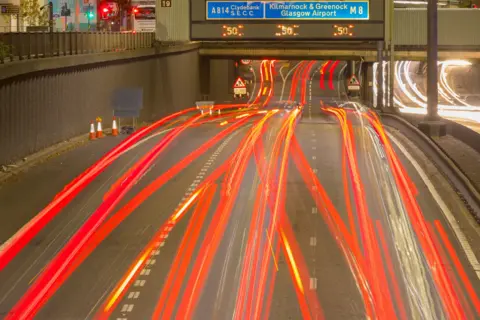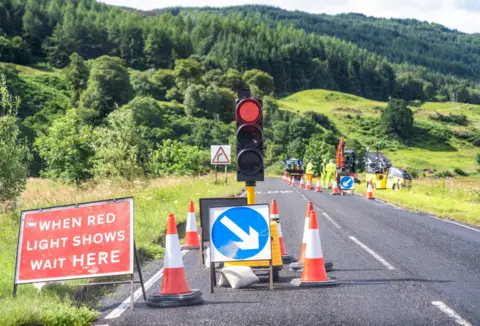Why are there more roadworks in Scotland than ever before?
 Getty Images
Getty ImagesComplaining about the amount of roadworks is something of a national pursuit - but it is one that appears to increasingly be justified.
The number of recorded roadworks in Scotland is now 28% higher than it was before the Covid pandemic.
The end result, a fixed pothole or faster broadband connection, is welcome - but roadworks can mean increased congestion which affects motorists, cyclists and bus users.
Kevin Hamilton, the Scottish Road Works Commissioner (SRWC), is the man charged with improving the planning and quality of roadworks in Scotland.
This low-key public body holds the key to understanding why so many roads and pavements are being dug up, and what happens when the work is not up to scratch.
All repairs and improvements to roads are the responsibility of local councils or Transport Scotland.
Utility firms do everything else, such as laying new pipes and cables.
These organisations are required to tell the SRWC what they are doing and recorded activity has been on the rise for years.
In 2019/20 the watchdog got 129,713 notices of work starting before hitting a record 166,295 in 2024/2025.
This is significantly up on the 104,670 works in 2009/10, the earliest year with comparable figures.
Why are there so many roadworks in Scotland now?
The amount of traffic on Scotland's roads has been steadily increasing over the last three decades, although there was a drop during the pandemic years.
Transport Scotland data shows that in 2019, traffic volumes on the country's major roads were 46% higher than in 1995.
Increased traffic leads to a lot more wear and tear that needs to be fixed.
But it is what lies beneath the road surface that accounts for most of the disruption.
 Getty Images
Getty ImagesWater, gas, electricity and telecoms utility firms are increasingly the main instigators of roadworks in Scotland.
Contractors in charge of telecoms projects like the fibre-broadband rollout are doing the most digging, accounting for 60% of the utilities roadworks last year.
Elsewhere, soaring domestic demand for heat pumps and electric car chargers means more upgrades to the electricity network are required at street level.
Better reporting of projects being undertaken by roads authorities is also a factor in the increase number of recorded works, according to the SRWC.
When are there the most roadworks?
Monthly data for the last two years, released under freedom of information laws, shows a substantial drop in activity towards Christmas followed by a surge in works from January onwards.
Between December last year and March there was a 61% hike in the number of notified active works, a shift that will not have escaped the notice of most road users.
It is perhaps not surprising that most roadworks take place when the weather is better - but the downside to this is that it often aligns with the busiest traffic months of the year in Scotland.
How many roadworks are in my council area?
Search using local authority name
Scotland has 35,514 miles (57,187km) of roads so that is a lot of asphalt and concrete to maintain.
The local authority area with the most roadworks in 2024/25 was Glasgow (12,660), followed by Edinburgh (11,536) and then South Lanarkshire (11,413).
By contrast just 571 works took place in Shetland last year.
Works on motorways and trunk roads - which account for 7% of the road network but carry 40% of the traffic - are counted separately to activity in each council area.
Last year the organisations in charge of maintaining these main routes on behalf of Transport Scotland carried out a total of 19,037 repairs.
What happens when things go wrong?
One of the big frustrations for road users about roadworks is when they seem to be poorly planned or simply not up to the correct standard.
The good news is the quality of the road surface repairs carried out is on the rise, with around 90% of works inspected hitting the expected standards - more than twice the rates being achieved 20 years ago.
But issues still persist when it comes to co-ordinating with other utility firms as well as sticking to agreed timetables.
 Getty Images
Getty ImagesUtility firms can face penalty notices from councils for roadworks failures and last year a total of 3,618 of these fines were issued.
However, not every local authority uses these powers. A total of seven councils, including Falkirk, Moray and Dumfries & Galloway, have failed to issue any such fines in the last five years.
Councils do not fine themselves for substandard work.
In addition, the SRWC has enforcement powers and last year "a small but persistent number of utilities whose reinstatements did not meet the standards" were hit with fines totalling £138,000.
New inspection powers granted to the SRWC last year show safety issues also persist at many sites.
Between April and November more than 1,200 sites were inspected and nearly 400 non-compliance with safety standards were spotted, mainly relating to a lack of adequate pedestrian facilities.
The SRWC also issues annual ratings for each of the road and utility organisations responsible for digging up the country's road network.
In 2023/24, a total of 31 organisations were found to be delivering consistently poor performance for at least six months, including the City of Edinburgh Council and SP Energy Networks.
A further 30 were found to be managing their works well.
